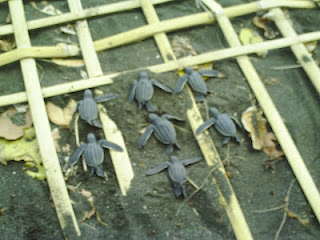
Every seven years, leatherback sea turtles living off the coast of California swim thousands of miles west to Papua New Guinea. This global migration, and the support of Global Greengrants Fund donors, connects two worlds in one cause: the protection of a critically endangered species.
Leatherback sea turtles are the largest living reptile in the world. Growing from four inches to eight feet, these gentle giants can weigh up to 2,000 pounds and prey mostly on jellyfish. Sadly, the population of these modern-day dinosaurs is in jeopardy.
Local fishermen have been overharvesting leatherback turtle eggs and harming nesting mothers. Many grown turtles have died after getting caught in fishing equipment. The pristine beaches where the turtles have always nested are disappearing to large developments. The species is critically endangered.
No one has felt this shift more profoundly than villagers in Papua New Guinea. The country is home to six of the world’s seven species of marine turtle, and leatherback turtle eggs—which are laid on beaches by the hundreds—have long been a staple in local diets.
Mas Kagin Tapani: A Local Group With a Broad Impact
Recognizing the vulnerability of leatherback sea turtles, one local organization has rallied around its defense. Mas Kagin Tapani (or Makata) was formed by local environmental defenders and indigenous tribal peoples whose beaches the sea turtles visit to nest. For over five years, the organization has been reviving the marine turtle population in the Western Pacific through community education initiatives.
With a small grant from Global Greengrants Fund, Makata provided educational trainings on sustainable consumption of turtle eggs. As communities became empowered to protect the turtles, they began to develop action plans to reduce their impacts on the endangered population. Read more about the project that people like you helped to fund >>
Since their first conservation efforts, the organization has built national momentum and gained international attention. Makata’s national coordinator, Wenceslaus Magun, prides the organization on its ability to “change the mindset and attitude of the majority of people in Karkum [Village] to stop killing and harvesting turtle eggs for consumption.”

The success of Makata’s work in the village of Karkum has brought important media and tourist attention. The National Australian Indigenous Land and Sea Management Alliance constructed a billboard and furnished the Karkum Eco-Lodge to attract attention to the initiative. The organization is expanding their outreach.
The initial trainings have sparked significant interest in addressing environmentally destructive activities, including mining and waste disposal. Makata is leading important campaigns to stop sea bed mining and submarine tailings disposal in the Bismarck and Solomon Seas. The organization has now grown to include four distinct programs: sea turtle restoration and protection, advocacy and campaigning against seabed mining, community livelihood projects, and community development trainings.
With future support, Makata aims to balance its conservation work with investments in community well-being, working towards the Papua New Guinea’s Millennium Development Goals. Supporting this organization extends beyond the benefits of environmental protection; their work is empowering indigenous populations to create healthier communities.
